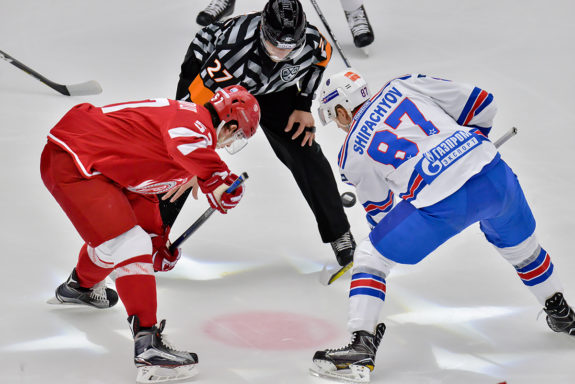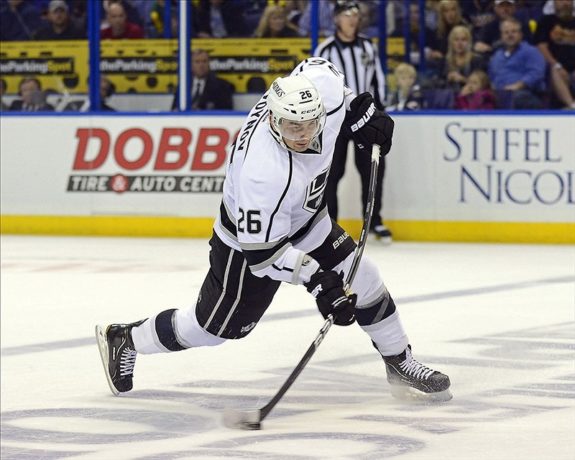The Olympic Athletes from Russia won the gold medal in Pyeongchang, South Korea, in 2018 in the first Winter Olympic Games that didn’t feature current NHL players in the men’s ice hockey tournament since 1994. Given the unfortunate news that NHL players will miss out on a chance to represent their countries at the 2022 Winter Olympics in Beijing, China, the most established talent in the tournament will once again come from the Russian ranks.
Related: 2022 Olympic Men’s Hockey Team ROC Preview
Russian players will have to switch to yet another name, the Russian Olympic Committee (ROC), for the Beijing games. They will not be able to fly their nation’s flag, and all official affiliation with Russia is prohibited as part of sanctions enforced by the International Olympic Committee (IOC) based on several doping scandals. They will, however, enter the men’s ice hockey tournament as favorites to repeat as gold medal winners.
The KHL- Second Best League in the World
Most international hockey experts consider the Russian Kontinental Hockey League (KHL) the second most competitive league in the world behind only the NHL. Eugene Helfrick of The Hockey Writers noted that the league’s “quality and depth” exceed the level of other reputable international leagues like the Swedish Hockey League (SHL) and the Finnish-based Liiga. Roughly 70% of the KHL talent pool is Russian.

The participation of KHL players in Beijing will give the ROC the deepest roster. The 19 forwards, 12 defensemen, and five goaltenders entering their Olympic camp all have KHL experience in their respective professional careers. Dmitri Vishnevsky and Vadim Shipachyov have the longest tenures having played in parts of each of the league’s 14 seasons.
It is not uncommon for professionals to opt for the KHL with the opportunity for an NHL contract still on the table. Ilya Kovalchuk famously walked away from the final 12 years of his NHL contract worth $77 million in July 2013. Other players choose the international route for various reasons, including expanded roles, financial interests, or a personal comfort level outside of North America.
The KHL has advanced its reputation by building a similar structure to the NHL. The league has 27 total teams in two conferences. Eight teams from each conference make the playoffs. Each team played 62 games in 2020-21, and they are scheduled to play 56 in 2021-22. They have implemented a salary cap system, and almost all rinks have transitioned to NHL regulation size. Manitoba native Nigel Dawes spoke to ESPN in 2020 about the growth of the league’s legitimacy over time. He said that the questionable financial environment that led to the shocking stories that float through circles of North American players is “long gone.”
Transition from Pyeongchang to Beijing
The 2018 gold medal winners featured more recognizable names than the 2022 team will. Kovalchuk and expected future Hockey Hall of Famer Pavel Datsyuk headlined a star-studded group of players with NHL-caliber talent in Pyeongchang. Kirill Kaprizov, reigning Calder Trophy winner as the NHL’s best rookie, and two-time Stanley Cup champion Slava Voynov also finished as top-five scorers on the team along with Kovalchuk and Datsyuk.

Voynov will be the only one of the four returning to play in Beijing. He played 254 regular season and playoff games in parts of four seasons for the Los Angeles Kings from 2011-2014. In 2013-14, Drew Doughty was the only Kings skater who logged more combined regular-season and playoff ice time than Voynov. The 6-foot-0 blueliner finished sixth on the team in scoring during the regular season with a career-high 34 points. He left the NHL at age 25 largely due to fallout from domestic abuse charges.
Outside of Voynov, the ROC’s roster in Beijing won’t feature as many recognizable names for North American hockey fans. However, the camp invitees still include nine players with NHL experience and 12 players considered NHL prospects. Nikita Gusev returns after leading the 2018 tournament with 12 points. He scored twice in the third period of the gold medal game against Team Germany and assisted Voynov’s winning goal in overtime. He played 97 games with the New Jersey Devils and Florida Panthers during the 2019-20 and 2020-21 seasons.
Gold Medal Favorites
After commissioner Gary Bettman announced the decision from the NHL to cancel participation, the ROC leapfrogged Team Canada, Team USA, and Team Sweden as the odds-on favorites to take the gold at +160.
The absence of current NHL talent drastically hurts the previously expected favorites, but the decision by the KHL to send its players to the Olympics makes the depth of the Russian roster the strongest in Beijing. However, Team USA head coach David Quinn spoke about the parity in the Pyeongchang tournament and how the Germans took the highly-talented Russians to overtime in the final game.
“The Russians are perceived to be the team with a leg up on everybody just because of the KHL, but they had a hard time with Germany in the gold medal game. I just think it’s going to be a very, very competitive tournament.”
-David Quinn
The ROC should expect tough competition from the best players in the world outside the NHL. They will face plenty of veterans with legitimate professional track records and some of hockey’s top prospects in their quest to repeat as gold medalists.